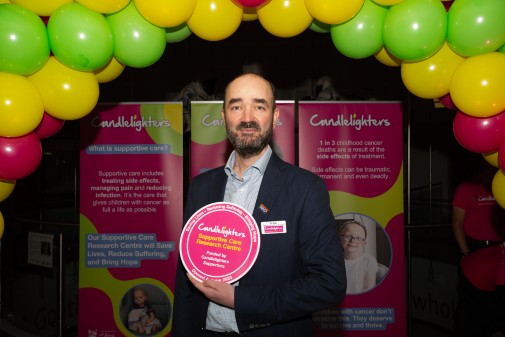Pioneering research led by the University of York is transforming supportive care for children and young people with cancer, directly driven by the crucial insights of patients and their families.
 Professor Bob Phillips. Photo credit: Charlotte Hedgecock Photography
Professor Bob Phillips. Photo credit: Charlotte Hedgecock Photography
The Candlelighters Supportive Care Research Centre (CSCRC), a £1 million partnership launched two years ago between the Yorkshire-based children's cancer charity Candlelighters and the University of York's Centre for Reviews and Dissemination, is leading the drive to improve the experience and outcomes of children undergoing cancer treatment.
Groundbreaking
At the heart of this groundbreaking work are the Patient Family Involvement Research Groups, where children, young people, and their families meet with researchers to guide the focus and design of vital supportive care studies.
The Groups, primarily run from the Candlelighters family support centre in Leeds, provide a platform for those with direct experience of childhood cancer to influence research priorities.
Professor Bob Phillips, one of the world's leading experts in childhood cancer research, leads the CSCRC and is a Paediatric Oncology Consultant at Leeds Children's Hospital and Professor in Paediatric Oncology at Hull York Medical School.
He said: "These are really interactive and thoughtful sessions, which draw on the expertise and experience of childhood cancer patients and their parents. This work helps us to improve and prioritise the research needed to improve supportive care for children and young people with cancer.
"Researchers from around the world want to include the considerations from the group in their planned works. It's highly unusual and very positive to have a group where patients and parents are so engaged."
Legacy
Shaun was diagnosed with acute lymphoblastic leukaemia in April 2015, aged five. He underwent treatment and a stem cell transplant which was initially successful, but sadly he relapsed and died in June 2017.
Since then, Shaun's mum, Tina, has channelled her experience into supporting research that can improve care for other children. Taking part in the Patient and Family Involvement research groups at Candlelighters helps her carry forward Shaun's legacy and ensure his experiences make a difference.
"Research is so important to us as a family. Without it, we wouldn't have had the time that we had with Shaun," she said. "So even though he's not benefiting from it now, he did benefit from it. We probably had two and a half years more than we would have done. Children many years ago with Shaun's diagnosis would have died very quickly."
"Mucositis, for example, was something he suffered really badly with. Being involved with new treatments like the red-light therapy, which was the focus of a recent research group, makes me feel positive that children in the future aren't going to go through what Shaun went through. The PPI groups are a really important way for children now to have a voice."
In August 2023, 11-year-old Joshua received the diagnosis of cancer. His aggressive lymphoma required intensive chemotherapy treatment and a four-month stay in Leeds General Infirmary.
Two years on, Josh is recovering well and the whole family have been doing everything they can to raise money and awareness of childhood cancer. Helen and Gavin, Josh's mum and dad, explain why all three of them have been taking part in the research groups.
Treatments
Helen said: "We're about to embark on our third group. I think we're the kind of people, Josh included, that if we can make a small fraction of someone's experience better, then we feel it's our obligation to try and help.
"The group sessions are great. They're a mixture of updates as to where the research studies are up to, and then they get our experiences and opinions on things, including the kids. There are families with completely different experiences, different diagnoses, different treatments and different outcomes, so you get such a lot of different perspectives.
"Our journey with research started when Josh was in isolation. He did a video of him using the red light therapy on himself, to show it's nothing to be afraid of, and we did an interview about what it was like. It was something we really benefited from, so it was really important to us that we tried to do as much as we could, so that other families didn't have to go through the same complications with mucositis that Josh did."
Impact
Hearing that things are actually changing or being put in place because of the research groups and the Supportive Care Research Centre, it's amazing. Knowing that we are helping to shape things, even if it helps just one patient or family, that's mission accomplished for us."
Professor Phillips added:"A startling statistic is that of all children who sadly die with cancer, one in three die not because of the cancer itself, but because of the side effects of their treatment. Worse still, research into reducing these side effects for children is under-resourced, sparse, and inadequate."
The CSCRC is dedicated to tackling this issue by focusing on managing side effects, reducing infection, and controlling pain, ultimately increasing the likelihood of survival and reducing long-term impacts.
Emily Wragg, CEO of Candlelighters, added: "More than 2,400 children and teenagers are diagnosed with cancer in the UK each year. Amazing progress has been made in understanding and treating childhood cancers. Today, around 80% of children or young people diagnosed with cancer will survive.
"This is an incredibly encouraging statistic, but despite advances in curative medicine, little has been done to improve the experience of living through and beyond cancer.
"Initial investment from Candlelighters enabled the opening of the groundbreaking Candlelighters Supportive Care Research Centre – the first dedicated centre in the world to focus on improving care for children with cancer.
"Less than 5% of all cancer research is spent researching the care needs of cancer patients, especially young people, and how best to meet them. We are funding research that most others don't, in this vital yet underfunded area of cancer care."
In just two years, the CSCRC has already driven significant research, often directly inspired by the Patient Family Involvement Research Groups:
- Ambulatory Chemotherapy: The Centre has secured separate funding of £700,000, led by Dr Jess Morgan, Deputy Director of the centre, to develop an ambulatory (at-home) chemotherapy research programme for children at Leeds Children's Hospital and the University of York's Centre for Reviews and Dissemination.
- International Nutrition Guidelines: The Centre contributed to the publication of new international guidelines that expand the range of foods children can safely eat during treatment, supporting nutrition and mental wellbeing.
- Treating Mucositis: Work is progressing to standardise the treatment of mucositis, the debilitating mouth blistering caused by chemotherapy, using highly effective red-light treatment.
Further information:
- Established in 1976, Candlelighters is a children's charity dedicated to combating childhood cancer, leukaemia, and serious blood disorders.
- The charity supports children and families from all over Yorkshire.
- Each year, in Yorkshire alone, over 150 children and teenagers are diagnosed with some form of cancer.
- The charity offers family support in many forms, from practical financial support for families and funded holidays, to talking therapies, wellbeing treatments and support groups for siblings.
- In February 2015, Candlelighters opened The Square – a support centre for families who are being, or have been, affected by childhood cancer.
- The charity invests around half a million pounds each year into research.
- Candlelighters invests in the wards at the Leeds General Infirmary by funding posts and equipment.











